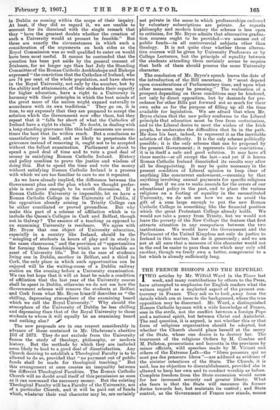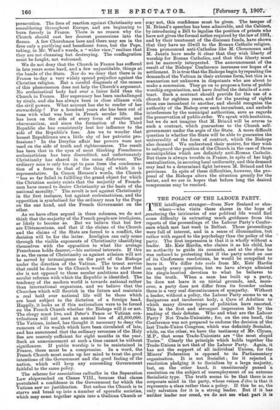THE FRENCH BISHOPS AND THE REPUBLIC.
91WO articles by Mr. Wilfrid Ward in the Times last 1_ week, and many contributions by others to the Press, have attempted to emphasise for English readers what the writers regard as a neglected aspect of the present con- troversy in France. They ask us to look ,away from the details which are at issue to the background, where the true opposition may be discerned. Mr. Ward, a distinguished Roman Catholic layman with a wide knowledge of France, sees in the strife, not the conflict between a foreign Pope and a national spirit, but between Christ and Antichrist. The real question, it is argued, is not whether this or that form of religious organisation should be adopted, but whether the Church should place herself at the mercy of the State, whose one desire is to destroy her. The treatment of the religious Orders by M. Combos and M. Pelletan, persecutions and boycotts in the provinces by minor officials, wild speeches made by M. Viviani and others of the Extreme Left—the " libres peuseurs qui ne sent pas des penseurs libres "—are adduced as evidence of the sinister intentions of the State. The Church, it is said, has no objection to diisestablishment, provided she is allowed to keep her own and to conduct worship as before. Complete freedom from the State connexion would mean for her increased security and greater liberty. What she fears is that the State will renounce its former duties towards her, but maintain its control; and State control, as the Government of France now stands, means
persecution. The fires of reaction against Christianity are smouldering throughout Europe, and are beginning to burn fiercely in France. There is no reason why the Church should cast her dearest possessions into the flames. A few Churchmen here and there may see in the fires only a purifying and beneficent force, but the Pope, taking, in Mr. Ward's words, a "wider view," realises that they are not cleansing but destroying. The conflagration must be fought, not welcomed.
We do not deny that the Church in France has suffered in late years some hard, and a few unjustifiable, things at the hands of the State. Nor do we deny that there is in France to-day a very widely spread prejudice against the Christian religion. But a careful diagnosis of the causes of this phenomenon does not help the Church's argument. No ecclesiastical body had ever a fairer field than the Church in France. Her supremacy has been unchallenged by rivals, and she has always been in close alliance with the civil powers. What account has she to render of her stewardship ? For a hundred years she has been out of tune with what was best in French secular life. She has been on the side of every form of reaction and obscurantism, and since the formation of the Third Republic she has consistently lent her influence to the side of the Republic's foes. Are we to wonder that honest Republicans are a little shy of her patriotic pro- fessions? In the Dreyfus affair her powers were not used on the side of truth and righteousness. The result has been that in the eyes of most thinking Frenchmen ecclesiasticism has been discredited, and unfortunately Christianity has shared in the same disfavour. The ordinary man is only too apt to pass from the condemna- tion of a form to that of the thing of which it is representative. In Canon Henson's words, the Church "has so far failed in fulfilling the grand object for which the Christian society exists that the majority of French- men have ceased to desire Christianity as the basis of the national morality." The revolt is not against Christianity in the first instance, but against ecclesiasticism, and the opposition is symbolised for the ordinary man by the Pope on the one hand, and the French Government on the other.
As we have often argued in these columns, we do not think that the majority of the French people are irreligious, or likely to become so. But we believe that but few are Intramontane, and that if the claims of the Church and the claims of the State are forced to a conflict, the decision will be for the latter. Irreligion can only come through the visible exponents of Christianity identifying themselves with the opposition to what tho average Frenchman holds dearest,—his national interests. If this is so, the cause of Christianity as against atheism will not be served by intransigence on the part of the Bishops under the direction of the Vatican. The truest service that could be done to the Church would be to show that she is not opposed to those secular ambitions and those seculai reforms with which the Republic is identified. The tendency of the modern world is towards national rather than international organisms, and we believe that the Churches which will flourish in the future and maintain a real hold over national life will be those which are least subject to the dictation of a foreign head. Happily, it looks as if this nationalism were to be forced on the French Church whether the Bishops will it or not. The clergy must live, and Peter's Pence or Vatican con- tributions will not meet an annual loss of £1,600,000. The Vatican, indeed, has thought it necessary to deny the rumours of its wealth which have been circulated of late, and has announced that the ordinary revenues of the Holy See are scarcely sufficient for eight months in the year. Such an announcement at such a time cannot be without significance. If public worship is to be maintained in France, there must be a compromise. In a word, the French Church must make up her mind to trust the good intentions of the Government and the good feeling of the nation, which will keep any succeeding Government faithful to the same policy.
The scheme for associations cultuelles in the Separation Law shipwrecked on Clause VIII., because that clause postulated a confidence in the Government for which the Vatican saw no justification. But unless the Church is to starve and break up into a number of sporadic societies, which may come together again into a Gallican Church or may not, this confidence must be given. The temper of M. Briand's speeches has been admirable, and the Cabinet, by introducing a Bill to legalise the position of priests who have not given the formal notice required by the law of 1881,. and by their treatment of the diocesan funds, have shown that they have no illwill to the Roman Catholic religion. Even pronounced anti-Catholics like M. Clemenceau. and M. Jaures have made it clear that they wish liberty of worship for Roman Catholics, and that this liberty must not be narrowly interpreted. The announcement of the result of the Bishops' Conference increases our hopes of a settlement. It is true that the Bishops begin by repeating the demands of the Vatican in their extreme form; but this is a mannerism not unknown in disputants who are about to make a concession. They go on to propose a form of public worship organisation, and have drafted the details of a con- tract. Such a contract should provide for the use of a church for eighteen years, and for the 'passing of rights from one incumbent to another, and should recognise the authority of the Bishop over each incumbent, and exclude interference by the municipal authorities, save as regards the preservation of public order. We speak with hesitation, but we do not imagine that M. Briaud will be averse to such a contract, which guarantees to the Church self- government under the aegis of the State. A more difficult question is whether the State will be able to guarantee the universality of the form of contract, which the Bishops also demand. We understand their motive, for they wish . to safeguard the position of the Church in the case of those municipalities which are definitely anti-Roman Catholic. But there is always trouble in France, in spite of her high centralisation, in securing local uniformity, and this demand may lead to a determined fight between M. Briand and the provinces. In spite of these difficulties, however, the pro- posal of the Bishops alters the situation greatly for the better, and we are in hopes that before long the desired compromise may be reached.







































 Previous page
Previous page